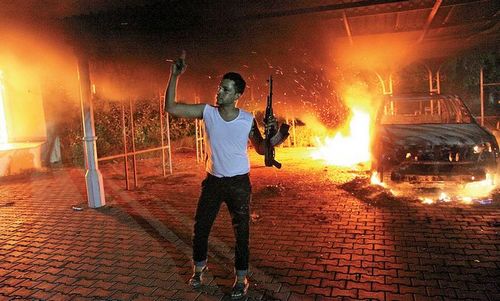Libya fiasco shows sad reality of US policy

US ambassador to Libya, Chris Stevens, was killed along with three other embassy staff in a targeted rocket attack in Benghazi Tuesday. Killing an ambassador is against the humanitarian bottom line. It should be condemned worldwide.
On the same day, Egyptian protesters breached the US embassy in Cairo. Both incidents were triggered by a US film which the Arab world believes insulted the Prophet Mohammed while the US government refused to apologize. This is the most acute conflict between the US and the Arab world since the Arab Spring.
It is an extreme incident if an ambassador to a country is killed there. It usually signals the failure of foreign policies of the country where the ambassador is from. The US supported the Libyan war and Benghazi is the base camp of the revolution. The attack on the US ambassador there has a severe political meaning.
The US may have failed in its strategy to promote democracy in the Middle East over the past 10 years. It shows the difficulties facing the Middle East in realizing democracy. The strategy has brought neither a beneficial process of local order nor has it given the Arab world an obvious inclination to the West.
The Obama administration advocates democracy in the Middle East and eradication of strongman politics. But the US refused to put further resources into the Middle East, while shifting its attention to the Asia Pacific, giving the US less leverage in the region.
Since Osama bin Laden was killed, the US thought its anti-terrorism efforts could come to an end and the threat of terrorism against the US was reduced. The death of Stevens will make the US rethink this.
The attack will surely touch the US, and the entire West, deeply. The clash of civilizations between the West and the Arab world hasn't been reduced by the revolution. On the contrary, with strongman politics gone, the public's discontent toward the West is growing without being checked.
The Internet has helped display the US public's disrespect toward Arabic civilization. In recent years, there have been several instances of US soldiers desecrating the Koran, sparking serious protests from the Arab population.
The 9/11 attack was conducted by Arabs. Now a US ambassador has been killed in an Arab country. Though it has been more than a decade since the 9/11 attack, history hasn't really moved a long way. The latest attack may be a sign of anarchy in the region. Religion won the first victory, but it remains highly uncertain which side will win the next round.
American diplomats face risks to their lives in many countries. This danger carries a deep political connotation. We hope the US is careful in removing the dangers in the world. It is for the safety of their diplomats, and also for world peace and stability.
Related Report:
Obama condemns killing of US embassy staff